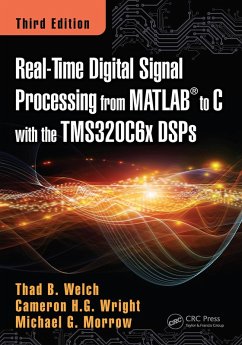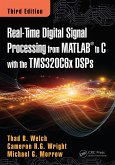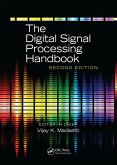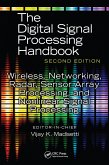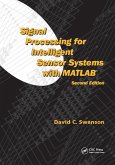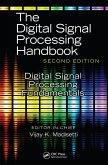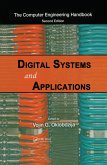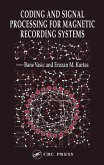Real-Time Digital Signal Processing from MATLAB to C with the TMS320C6x DSPs (eBook, PDF)


Alle Infos zum eBook verschenken

Real-Time Digital Signal Processing from MATLAB to C with the TMS320C6x DSPs (eBook, PDF)
- Format: PDF
- Merkliste
- Auf die Merkliste
- Bewerten Bewerten
- Teilen
- Produkt teilen
- Produkterinnerung
- Produkterinnerung

Hier können Sie sich einloggen

Bitte loggen Sie sich zunächst in Ihr Kundenkonto ein oder registrieren Sie sich bei bücher.de, um das eBook-Abo tolino select nutzen zu können.
The software in this new edition supports the latest high-performance hardware, including the powerful, inexpensive, and versatile OMAP-L138 Low Cost Development Kit from Texas Instruments. This book utilizes a highly practical, step-by-step framework that provides hands-on experience in real-time DSP, rather than relying on theory alone. The chapters utilize a series of demonstrations, exercises, and applied projects that begins with a quick overview of the pertinent theory, progresses to applying the concepts using MATLAB, and ultimately running applicable programs in real-time on some of…mehr
- Geräte: PC
- mit Kopierschutz
- eBook Hilfe
- Größe: 15.32MB
![Real-Time Digital Signal Processing from MATLAB to C with the TMS320C6x DSPs (eBook, ePUB) Real-Time Digital Signal Processing from MATLAB to C with the TMS320C6x DSPs (eBook, ePUB)]() Thad B. WelchReal-Time Digital Signal Processing from MATLAB to C with the TMS320C6x DSPs (eBook, ePUB)48,95 €
Thad B. WelchReal-Time Digital Signal Processing from MATLAB to C with the TMS320C6x DSPs (eBook, ePUB)48,95 €![The Digital Signal Processing Handbook - 3 Volume Set (eBook, PDF) The Digital Signal Processing Handbook - 3 Volume Set (eBook, PDF)]() The Digital Signal Processing Handbook - 3 Volume Set (eBook, PDF)361,95 €
The Digital Signal Processing Handbook - 3 Volume Set (eBook, PDF)361,95 €![Wireless, Networking, Radar, Sensor Array Processing, and Nonlinear Signal Processing (eBook, PDF) Wireless, Networking, Radar, Sensor Array Processing, and Nonlinear Signal Processing (eBook, PDF)]() Vijay MadisettiWireless, Networking, Radar, Sensor Array Processing, and Nonlinear Signal Processing (eBook, PDF)224,95 €
Vijay MadisettiWireless, Networking, Radar, Sensor Array Processing, and Nonlinear Signal Processing (eBook, PDF)224,95 €![Signal Processing for Intelligent Sensor Systems with MATLAB (eBook, PDF) Signal Processing for Intelligent Sensor Systems with MATLAB (eBook, PDF)]() David C. SwansonSignal Processing for Intelligent Sensor Systems with MATLAB (eBook, PDF)80,95 €
David C. SwansonSignal Processing for Intelligent Sensor Systems with MATLAB (eBook, PDF)80,95 €![Digital Signal Processing Fundamentals (eBook, PDF) Digital Signal Processing Fundamentals (eBook, PDF)]() Vijay K. MadisettiDigital Signal Processing Fundamentals (eBook, PDF)74,95 €
Vijay K. MadisettiDigital Signal Processing Fundamentals (eBook, PDF)74,95 €![Digital Systems and Applications (eBook, PDF) Digital Systems and Applications (eBook, PDF)]() Digital Systems and Applications (eBook, PDF)52,95 €
Digital Systems and Applications (eBook, PDF)52,95 €![Coding and Signal Processing for Magnetic Recording Systems (eBook, PDF) Coding and Signal Processing for Magnetic Recording Systems (eBook, PDF)]() Coding and Signal Processing for Magnetic Recording Systems (eBook, PDF)223,95 €
Coding and Signal Processing for Magnetic Recording Systems (eBook, PDF)223,95 €-
-
-
Dieser Download kann aus rechtlichen Gründen nur mit Rechnungsadresse in A, B, BG, CY, CZ, D, DK, EW, E, FIN, F, GR, HR, H, IRL, I, LT, L, LR, M, NL, PL, P, R, S, SLO, SK ausgeliefert werden.
- Produktdetails
- Verlag: Taylor & Francis
- Seitenzahl: 480
- Erscheinungstermin: 19. Dezember 2016
- Englisch
- ISBN-13: 9781351848558
- Artikelnr.: 54222953
- Verlag: Taylor & Francis
- Seitenzahl: 480
- Erscheinungstermin: 19. Dezember 2016
- Englisch
- ISBN-13: 9781351848558
- Artikelnr.: 54222953
- Herstellerkennzeichnung Die Herstellerinformationen sind derzeit nicht verfügbar.
Cameron H. G. Wright, Ph.D., P.E., is a Professor in the Department of Electrical and Computer Engineering at the University of Wyoming. He previously taught at the U.S. Air Force Academy (USAFA) in the Department of Electrical Engineering, where he was a Professor and Deputy Department Head. A retired Lieutenant Colonel in the U.S. Air Force, he won the Brigadier General R. E. Thomas Award for Outstanding Contributions to Cadet Education in 1992 and 1993. In 2005 and 2008, he won the IEEE Student Choice Award for Outstanding Professor of the Year, the Mortar Board "Top Prof" Award at the University of Wyoming in 2005, 2007, and 2015, the Outstanding Teaching Award from the ASEE Rocky Mountain Section in 2007, the John A. Curtis Lecture Award from the Computers in Education Division of ASEE in 1998, 2005, and 2010, the Tau Beta Pi WY-A chapter Undergraduate Teaching Award in 2011, and the University of Wyoming Ellbogen Meritorious Classroom Teaching Award in 2012. Dr. Wright is a founding member of the Technical Committee on Signal Processing Education for the IEEE Signal Processing Society, a senior member of the IEEE, and a member of ASEE, the National Society of Professional Engineers, the Biomedical Engineering Society, SPIE (The International Society of Optical Engineering), Tau Beta Pi, and Eta Kappa Nu.
Michael G. Morrow, M.Eng.E.E., P.E., is a Faculty Associate in the Department of Electrical and Computer Engineering at the University of Wisconsin-Madison. A retired Lieutenant Commander in the U.S. Navy, he previously taught in the Electrical and Computer Engineering Department at the U.S. Naval Academy and in the Department of Electrical and Computer Engineering at Boise State University. Mr. Morrow won both the 2002 Department of Electrical and Computer Engineering Outstanding Educator Award and the 2003 Gerald Holdridge Teaching Excellence Award at the University of Wisconsin-Madison. He is the founder and president of Educational DSP (eDSP), LLC, a company devoted to the development of affordable DSP solutions for educators and students worldwide. He is a member of the Technical Committee on Signal Processing Education for the Institute of Electrical and Electronic Engineers (IEEE) Signal Processing Society, a senior member of the IEEE, and a member of the American Society for Engineering Education (ASEE).
and Reconstruction. FIR Digital Filters. IIR Digital Filters. Periodic
Signal Generation. Frame-Based DSP. Digital Filters Using Frames. The Fast
Fourier Transform. Spectral Analysis and Windowing. Section II: Projects.
Project 1: Guitar Special Effects. Project 2: Graphic Equalizer. Project 3:
Second-Order Sections. Project 4: Peak Program Meter. Project 5: Adaptive
Filters. Project 6: AM Transmitters. Project 7: AM Receivers. Project 8:
Phase-Locked Loop. Project 9: BPSK Digital Transmitters. Project 10: BPSK
Digital Receivers. Project 11: MPSK and QAM Digital Transmitters. Project
12: QPSK Digital Receivers. Section III: Appendices. Appendix A Code
Composer Studio: An Overview. Appendix B DSP/BIOS. Appendix C Numeric
Representations. Appendix D TMS320C6x Architecture. Appendix E Related
Tools for DSKs. Appendix F Using the Code Generator with MATLAB. Appendix G
Battery Power for the DSP Boards. Appendix H Programming Perils and
Pitfalls. Appendix I Comparison of DSP Board. Appendix J Abbreviations,
Acronyms, and Symbols. References. Index.
and Reconstruction. FIR Digital Filters. IIR Digital Filters. Periodic
Signal Generation. Frame-Based DSP. Digital Filters Using Frames. The Fast
Fourier Transform. Spectral Analysis and Windowing. Section II: Projects.
Project 1: Guitar Special Effects. Project 2: Graphic Equalizer. Project 3:
Second-Order Sections. Project 4: Peak Program Meter. Project 5: Adaptive
Filters. Project 6: AM Transmitters. Project 7: AM Receivers. Project 8:
Phase-Locked Loop. Project 9: BPSK Digital Transmitters. Project 10: BPSK
Digital Receivers. Project 11: MPSK and QAM Digital Transmitters. Project
12: QPSK Digital Receivers. Section III: Appendices. Appendix A Code
Composer Studio: An Overview. Appendix B DSP/BIOS. Appendix C Numeric
Representations. Appendix D TMS320C6x Architecture. Appendix E Related
Tools for DSKs. Appendix F Using the Code Generator with MATLAB. Appendix G
Battery Power for the DSP Boards. Appendix H Programming Perils and
Pitfalls. Appendix I Comparison of DSP Board. Appendix J Abbreviations,
Acronyms, and Symbols. References. Index.
